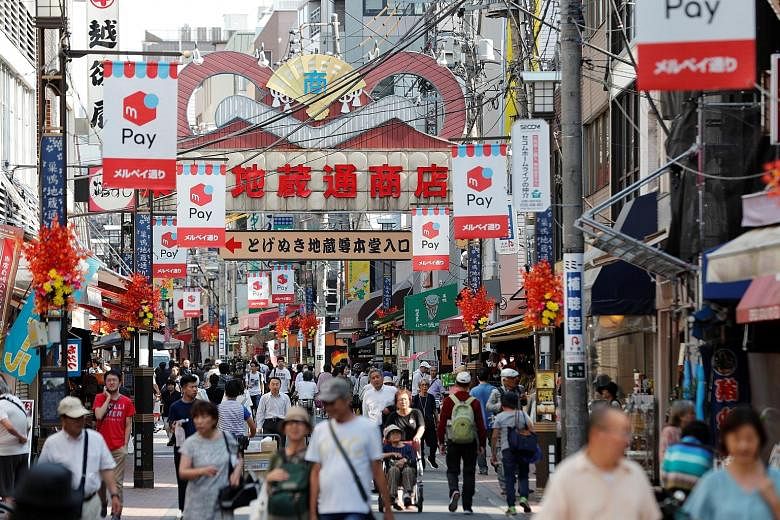TOKYO • Japanese Prime Minister Shinzo Abe asked his Cabinet yesterday to compile a package of stimulus measures to support the economy and build infrastructure to cope with large natural disasters, according to the government's top spokesman.
Chief Cabinet Secretary Yoshihide Suga told reporters that the package will include steps to promote investment for growth through aggressive use of fiscal investment and loan programmes.
The government will compile the package as soon as possible, although the size of spending will depend on proposals to be made by various ministries, Economy Minister Yasutoshi Nishimura told a news conference after a regular Cabinet meeting.
It will be the first stimulus package since 2016, as the longest postwar economic boom sputters amid the US-China trade war and as the government watches the impact of an Oct 1 tax hike.
Japanese policymakers have been under pressure to fend off heightening overseas risks with a diminishing tool-kit, as soft global demand hurts the export-reliant economy.
Finance Minister Taro Aso said the planned economic package should help enhance productivity and achieve strong growth to overcome the pressure caused by a declining population, which he said is the "biggest problem" Japan faces in the long run.
Mr Aso added that the size and scope of the stimulus measures still needed to be worked out. He suggested that a supplementary budget would be compiled by the year-end, along with an annual budget for the next fiscal year that starts in April 2020, to ensure the economic package would be rolled out over a 15-month period.
Mr Abe had told a top economic council on Thursday that the government will consider what policy measures it can take to prevent global risks from derailing the Japanese economy.
Japan's economic growth likely slowed to an annualised 0.8 per cent in July-September from 1.3 per cent in the second quarter, a Reuters poll showed this week.
The data will be reported next Thursday.
An increase in the sales tax to 10 per cent from 8 per cent, put in place since October, may also hurt consumption, analysts say.
A key Japanese economic gauge, the index of coincident economic indicators, rose a preliminary 2.0 points in September from the previous month, Cabinet Office data showed later yesterday, signalling an uptick in economic activity before the tax increase took effect.
The sub-indexes for retail sales and wholesale trade both rose 7.3 points in September from August, seeing their largest jumps since April 2015, due to demand for big-ticket items such as cars and household electronics, as well as cosmetics and medicines.
Slowing growth underscores the challenge for Mr Abe's government as it tries to strike a delicate balance between the need to boost growth and fix the industrial world's heaviest public debt burden that is more than twice the size of Japan's US$5 trillion (S$6.8 trillion) economy.
Some economists have raised concerns that additional public works spending would further strain the nation's dire public finances and aggravate a labour crunch in a fast-ageing population.
REUTERS

